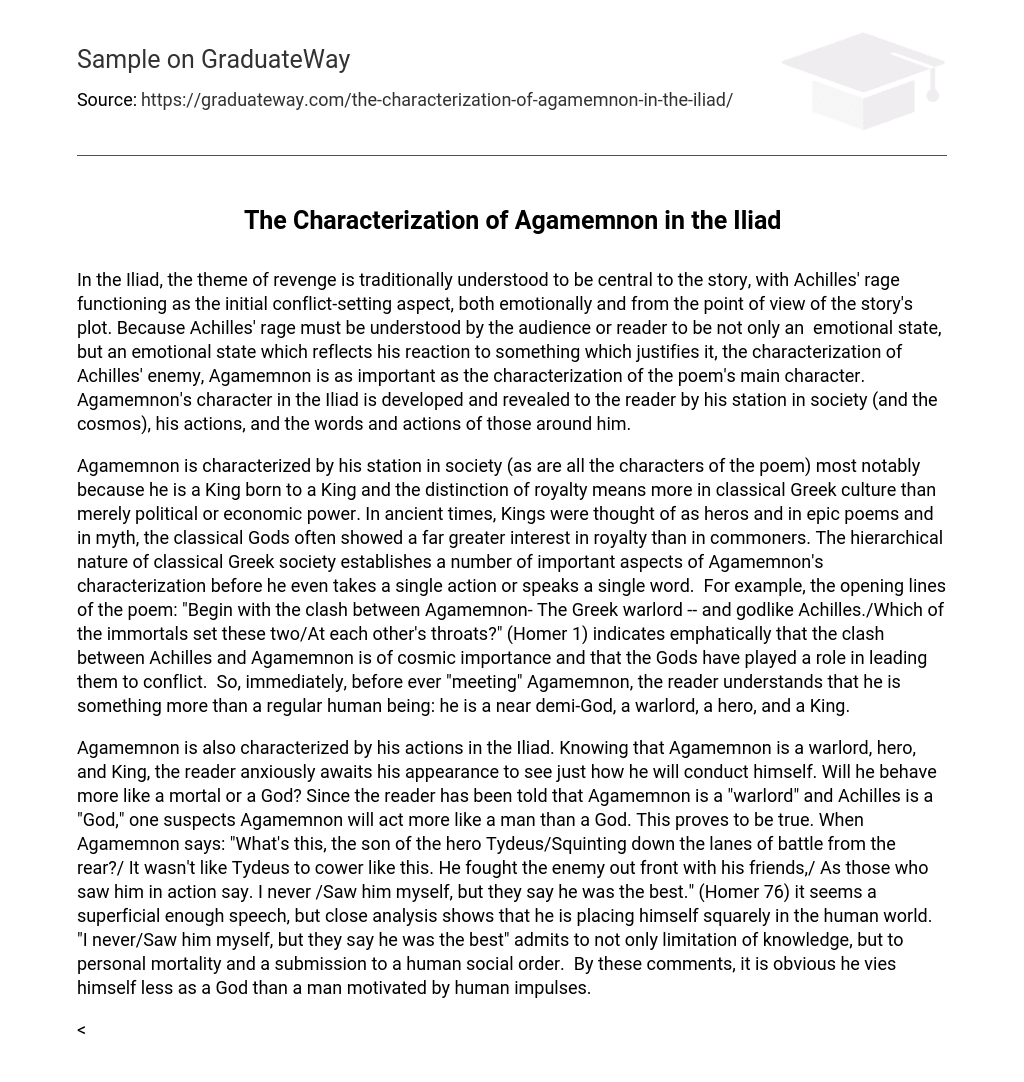In the Iliad, the theme of revenge is traditionally understood to be central to the story, with Achilles’ rage functioning as the initial conflict-setting aspect, both emotionally and from the point of view of the story’s plot. Because Achilles’ rage must be understood by the audience or reader to be not only an emotional state, but an emotional state which reflects his reaction to something which justifies it, the characterization of Achilles’ enemy, Agamemnon is as important as the characterization of the poem’s main character. Agamemnon’s character in the Iliad is developed and revealed to the reader by his station in society (and the cosmos), his actions, and the words and actions of those around him.
Agamemnon is characterized by his station in society (as are all the characters of the poem) most notably because he is a King born to a King and the distinction of royalty means more in classical Greek culture than merely political or economic power. In ancient times, Kings were thought of as heros and in epic poems and in myth, the classical Gods often showed a far greater interest in royalty than in commoners. The hierarchical nature of classical Greek society establishes a number of important aspects of Agamemnon’s characterization before he even takes a single action or speaks a single word. For example, the opening lines of the poem: “Begin with the clash between Agamemnon- The Greek warlord — and godlike Achilles./Which of the immortals set these two/At each other’s throats?” (Homer 1) indicates emphatically that the clash between Achilles and Agamemnon is of cosmic importance and that the Gods have played a role in leading them to conflict. So, immediately, before ever “meeting” Agamemnon, the reader understands that he is something more than a regular human being: he is a near demi-God, a warlord, a hero, and a King.
Agamemnon is also characterized by his actions in the Iliad. Knowing that Agamemnon is a warlord, hero, and King, the reader anxiously awaits his appearance to see just how he will conduct himself. Will he behave more like a mortal or a God? Since the reader has been told that Agamemnon is a “warlord” and Achilles is a “God,” one suspects Agamemnon will act more like a man than a God. This proves to be true. When Agamemnon says: “What’s this, the son of the hero Tydeus/Squinting down the lanes of battle from the rear?/ It wasn’t like Tydeus to cower like this. He fought the enemy out front with his friends,/ As those who saw him in action say. I never /Saw him myself, but they say he was the best.” (Homer 76) it seems a superficial enough speech, but close analysis shows that he is placing himself squarely in the human world. “I never/Saw him myself, but they say he was the best” admits to not only limitation of knowledge, but to personal mortality and a submission to a human social order. By these comments, it is obvious he vies himself less as a God than a man motivated by human impulses.
Agamemnon is also characterized by the words and actions of the people around him. When a messenger of Zeus speaks of him, for example, much is revealed about how the Gods view Agamemnon, which in turn, reveals a lot about his fate and aspects of his place in the cosmos that he is not privy to know:
” But when at last Agamemnon is wounded by an arrow or spear And mounts his chariot, then will Zeus Loan you the strength to kill and keep killing Until you come to the thwarted ships And the sun sets and sacred darkness falls.”
In conclusion, Agamemnon’s character in the Iliad is revealed to the reader by way of his innate standing in Greek society and in the Greek cosmos, his words and actions, and the words and actions of those around him, including Divine Beings who play as much a part in is characterization and after as mortals. Additionally, because Agamemnon is the principle antagonist of the Iliad, the development of his character is central to the themes of the poem.
Works Cited
- Homer. Iliad. Trans. Stanley Lombardo. Indianapolis, IN: Hackett Publishing Company, 1997.





